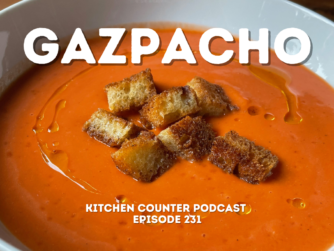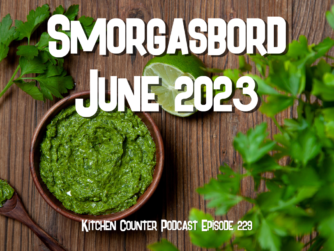Five Tips for Better Cooking
Today I’m talking about five tips that can help you cook better, eat better, be less stressed, and have more fun in the kitchen! These aren’t necessarily the most important five tips, and some are more practical while others are more philosophical. I’ll outline the tips below, but be sure to listen to the episode for all I have to say about them!
1. Don’t skimp on the essentials. Be sure to invest your energy and money in the right tools, the ones you use everyday and that can make the biggest difference on your time in the kitchen. For me that comes down to three things: a good knife, an instant read thermometer, and a heavy, good quality saute pan.
2. You can’t cook without fire. Have you ever tried to fry an egg and you don’t get that sizzle and pop when you drop the egg in the pan? Have you ever tried to brown ground beef and you just end up with some grey lumps of bland meat? You probably didn’t have your pan hot enough when you started cooking. Be sure to preheat your pans for a couple of minutes to make sure you get them up to temperature. This is especially true for heavier, thicker pans like cast iron.
3. Don’t be afraid to drop some acid while you cook. Wait, what? Well, not that kind of acid. I’m talking about acids to season your food. We all think of salt as the main way we add seasoning to food, but acids such as citrus juice and vinegars also work to bring out flavor in your dishes. A squeeze of fresh lemon juice is often all you need to take a dish from good to great.
4. Don’t fear your food. I talked about this on episode 53 of the Comatose Podcast. We come across an almost endless barrage of “don’t eat this, avoid that, don’t cook this” etc. GMO vs. non-GMO, gluten, organic or conventional, and so on. Stop worrying so much about the food you cook and eat. Chances are you’re doing just find. If you must obsess, look at all the data, from all the sources, and make up your own mind. Get past the spin.
5. Find you cooking “basecamp.” It’s good to spend time trying different ingredients and cooking techniques when you are learning to cook. That’s a great way to find what you like. But when you do find something you are passionate about, go deep. Don’t give up trying new things or experimenting, but learn your passion as thoroughly as you can and you’ll feel more comfortable branching out from there. Think of those things for which you master your basecamps. They are great points from which to explore new and exciting things because you have a better comfort level working from those points.
Connect with The Kitchen Counter Podcast!
Facebook: https://www.facebook.com/kitchencounterpodcast
Twitter: @TKCpodcast
Email:
fe******@ki*******************.com
If you liked what you heard, please consider subscribing in iTunes. You can also help out the show by leaving a positive review in the iTunes store (you know you want to)!



